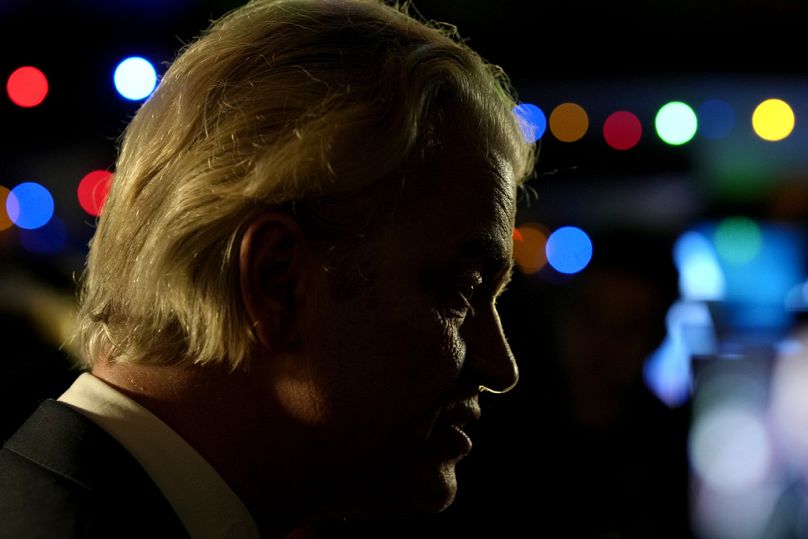The far-right populist has won a huge victory in one of the biggest political earthquakes in the Netherlands since World War II.
He's been called the Dutch Trump. He's been threatened with death countless times by Islamic extremists, convicted of insulting Moroccans and Britain once banned him from entering the country.
 ADVERTISEMENT
ADVERTISEMENT
 ADVERTISEMENT
ADVERTISEMENT
Now Geert Wilders has won a massive election victory in the Netherlands and is in pole position to form the next ruling coalition and possibly become the country's next prime minister.
His Party for Freedom (PVV) is projected to win 37 seats, according to the latest estimates, well ahead of their nearest rival: A left-wing alliance.
However, Wilders will likely have to convince other parties to join him in a coalition - something that could prove tricky. His target is 76 seats in the 150-seat parliament.
An exit poll revealing his landslide appeared to take even a 60-year-old political veteran by surprise.
In his first reaction, posted in a video on X, formerly Twitter, he spread his arms wide, put his face in his hands and said simply “35!” - the number of seats the poll then forecasted his party had won.
Wilders, with his fiery tongue, has long been one of the Netherlands’ best-known lawmakers at home and abroad. His populist policies and shock of peroxide blond hair have drawn comparisons with the former US President Donald Trump.
But, unlike Trump, he seemed destined to spend his life in political opposition.
The only time Wilders came close to governing was when he supported the first coalition formed by Prime Minister Mark Rutte in 2010. But Wilders did not formally join the minority administration and brought it down after just 18 months in office in a dispute over austerity measures. Since then, mainstream parties have shunned him.
They no longer can.
"We want to govern and... we will govern. [The seat numbers are] an enormous compliment but an enormous responsibility too," the 60-year-old said in his victory speech.
Wilders will have to persuade other parties to join him in a coalition. But whether he can piece together a stable coalition with former political foes remains to be seen.
The left-wing green alliance led by ex-EU commissioner Frans Timmermans is set to come second with 25 seats. He made clear he would have nothing to do with a Wilders-led government.
"We won't let anyone in the Netherlands go. In the Netherlands everyone is equal," Timmermans told supporters.
Ahead of the vote, the three other front-running parties said they would not join a Wilders-led government. That may change, however.
Coming in third place is likely the centre-right VVD under new leader Dilan Yesilgöz - the daughter of a Turkish asylum-seeker. Followed by a new party formed by Pieter Omtzigt, who vowed to restore faith in Dutch politics.
As well as alienating mainstream politicians, Wilders' fiery anti-Islam rhetoric also has made him a target for extremists and led to him living under round-the-clock protection for years. He has appeared in court as a victim of death threats, vowing never to be silenced.
Yet, he appears to have harnessed widespread frustration about migration with his promises to close the borders.
Voting Wednesday at The Hague City Hall, Wilders was flanked by burly security guards scanning the cavernous space for possible threats. He has moved from one safe house to another over nearly two decades.
In 2009, the British government refused to let him visit the country, saying he posed a threat to “community harmony and therefore public security.”
Wilders had been invited to Britain by a member of Parliament’s upper house, the House of Lords, to show his 15-minute film “Fitna,” which criticizes the Quran as a “fascist book.” The film sparked violent protests around the Muslim world in 2008 for linking Quranic verses with footage of terrorist attacks.
To court mainstream voters this time around, Wilders toned down the anti-Islam rhetoric and sought to focus less on what he calls the “de-Islamization” of the Netherlands and more on tackling hot-button issues such as housing shortages, a cost-of-living crisis and access to good health care.
His campaign platform nonetheless called for a referendum on the Netherlands leaving the European Union, an “asylum stop” and “no Islamic schools, Qurans and mosques,” although he pledged Wednesday night not to breach Dutch laws or the country's constitution that enshrines freedom of religion and expression.
He put on hold his promise to ban the Quran, Islam's holy book.
Wilders is set to become the longest-serving lawmaker in the Dutch parliament later this year. He has been a member of the House of Representatives since 1998, first for the centre-right People’s Party for Freedom and Democracy, where he mentored a young Rutte before quitting the party and setting up his Party for Freedom. He demonstrated a softer side Wednesday night by thanking his Hungarian-born wife Krisztina for her support.
Wilders also is a staunch supporter of Israel and advocates shifting the Embassy of the Netherlands there to Jerusalem and closing the Dutch diplomatic post in Ramallah, home of the Palestinian Authority.
Wilders is known for his hardline politics, but also for his witty one-liners. And his pets. His two cats, Snoetje and Pluisje, have their own account on X, formerly Twitter, with nearly 23,000 followers.












